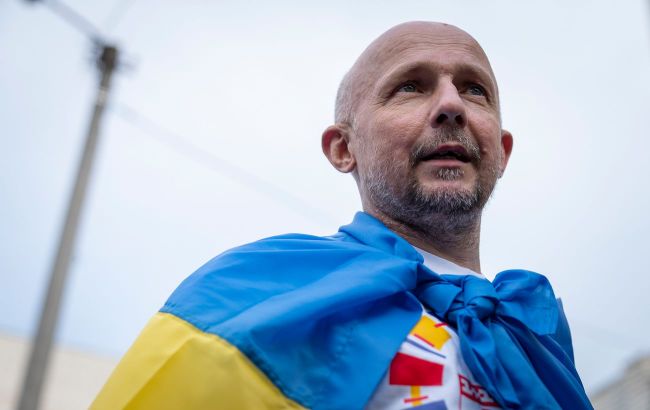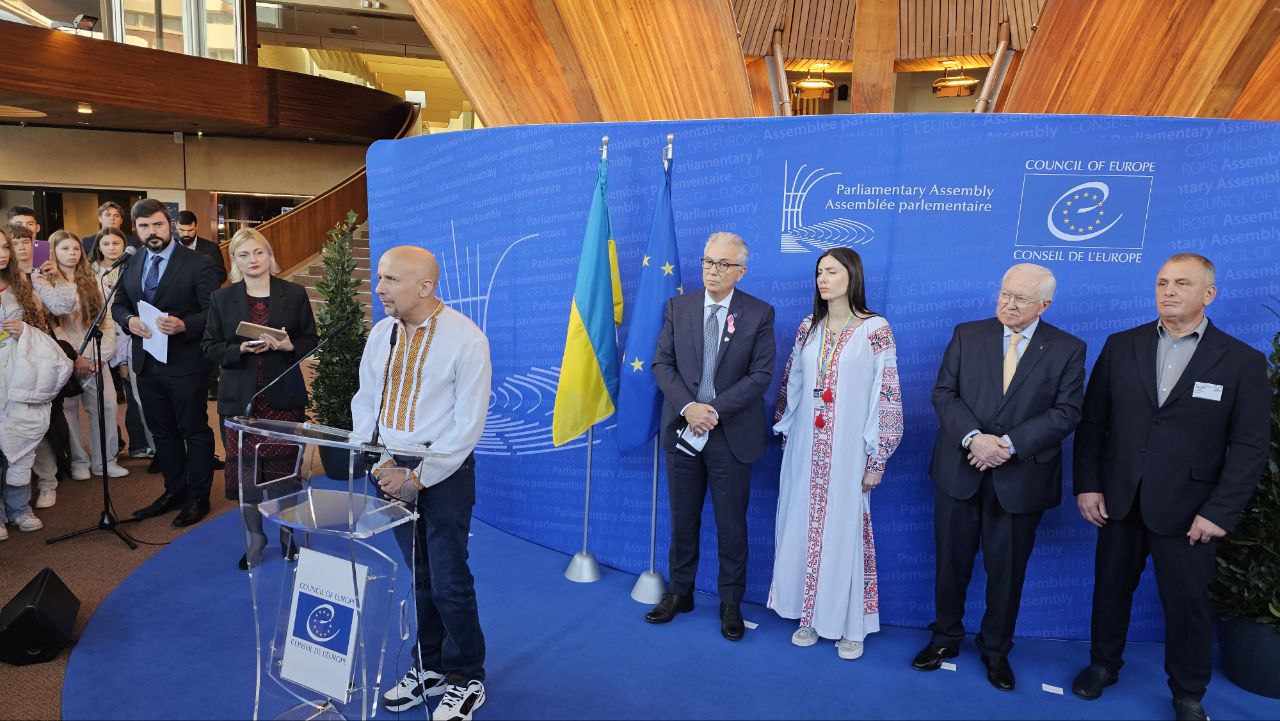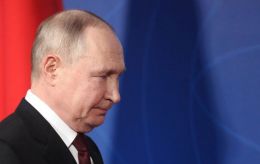Ukrainian journalist freed from Russian captivity: I came home to see politicians still tearing each other apart
 Dmytro Khyliuk after his release (photo: Getty Images)
Dmytro Khyliuk after his release (photo: Getty Images)
About what has changed in Ukraine after three and a half years in captivity, about European and Ukrainian politicians, the “good Russians,” and future plans — in a short interview with RBC-Ukraine spoke Dmytro Khyliuk, a Ukrainian journalist who spent three and a half years in Russian prisons.
UNIAN news agency correspondent Dmytro Khyliuk was abducted by Russians from his home in Kozarovychi near Kyiv in the first days of the full-scale war. After the retreat from the Kyiv region, the aggressors took Khyliuk with them, essentially as a hostage, and kept him in a Russian prison without pressing any formal charges.
In total, Khyliuk spent three and a half years in inhuman conditions of captivity, returning home as part of a prisoner exchange on August 24 of this year. Now, together with another freed journalist, Vladyslav Yesypenko, he went to Europe to tell his story and draw attention to other Ukrainians still unlawfully held by Russia.
RBC-Ukraine spoke with Khyliuk in Strasbourg, in the corridors of the Council of Europe, right after the opening of an exhibition dedicated to Ukrainian journalists illegally arrested by Russians.
– The Russians tore you out of normal life for over three years. Now that you have returned to Ukraine, what surprised you the most?
– Some things surprised me in a good way. For example, the fact that Kyiv is being built, despite the war.
Because in captivity we had such conversations, we wondered what the real estate prices were, especially those guys who had lost their homes. Everyone was thinking, guessing that when they return from captivity, where would be better to live. We thought the real estate market was frozen, especially in Kyiv, that no one was selling or buying anything.
But when I came home, I saw that no — whole complexes of high-rise residential buildings are sprouting up in Kyiv like mushrooms after rain. And that, of course, surprised me, pleasantly surprised me.
I was also pleasantly surprised by the ongoing digitalization. The same ChatGPT — it turns out this thing can even write poems. And quite good poems, better than some, let’s say, self-taught poets write. And with this ChatGPT you can consult about anything — it gives rather sound answers.
It’s also surprising that signs of war, unfortunately, remain in Kyiv. Those announcements about the curfew, about shelters in public transport. Because I was convinced that the war was already beyond Kyiv.
But what surprised me unpleasantly are these drones, Shaheds, long-range missiles…
– Do I understand correctly that there, in conditions of actual informational isolation, you imagined the war taking place where the front line is, plus some small area behind it? That regular massive strikes on the rear became news to you only after returning?
– Yes, because in captivity we also talked a lot, guessed, speculated about the situation at the front. And, let’s say, we came to the hypothetical assumption that since we had been in captivity for so long, the war was still ongoing — since we were still prisoners. Again, based on the idea that large battles cannot last three and a half years, we thought that, let’s say, it was like the Joint Forces Operation, only on a larger scale — that there was a line of demarcation stretching from Crimea to the Luhansk region.
But we didn’t know, again, about these Shaheds, about long-range missiles that Russia launches. That basically the entire territory of Ukraine is under threat — we didn’t know that.
– When you just walk the streets of Kyiv, is the picture you see now different from what you saw on February 23, 2022?
– I’ll say a paradoxical thing: there is a difference. I actually like this picture more, and I’ll explain why. Because before captivity, I didn’t pay attention to such banal things as, let’s say, an open store.
People sitting in a café, people sitting at those outdoor tables in warm weather. Back then, before captivity, it was just an ordinary thing. You just go about your business automatically and don’t pay attention.
But now I look at these things, I look at a conditionally peaceful city… Conditionally, I emphasize, because of the threats, because of the state of war — unfortunately, conditionally. But still, I feel joy, because I’m looking at scenes of essentially peaceful life in the capital, and that brings joy. Earlier I just didn’t notice such things.
– Now you’re in Europe, you came through Warsaw to Strasbourg. Do you feel a different mood, a different vibe, different air, when comparing conditionally peaceful Kyiv and completely peaceful Europe?
– I felt that even before, quite a while ago, I had been to Western Europe more than ten years ago, both for work and privately. Let’s say, Western Europe has always been relaxed, calm, stable. People here don’t stress, they have what, unfortunately, we don’t.
And didn’t have before the war, and even less so during the war. We don’t have confidence in tomorrow. Maybe someday we will, I hope that happens still in my lifetime.
And that, in fact, is what distinguishes us from European countries, from Western Europe.
– You and your colleague, also recently freed journalist Vladyslav Yesypenko, have many meetings here with PACE delegates, various officials, bureaucrats. From your sense, do these people really sincerely care about your fate, the fate of those Ukrainians still in captivity, the fate of Ukrainians in general? Or is it more of a formality, something they do as part of their duties?
– Let’s say, observing the reactions of people, of European politicians, I can say that some, it seemed to me, listened to our stories about captivity and sympathized sincerely. The other question is how to convert that personal, human sincerity into some political sincerity, and for that political sincerity to have an effect on the aggressor. That’s a big question, and I can’t judge it — time will tell.
Some people are indeed shocked, those who take it to heart, because these stories, unfortunately, are truly horrifying — this is really the Middle Ages.
I also, before my captivity, before the great war of 2022, couldn’t have imagined that civilians could be kidnapped just like that, massively, by the dozens, by the hundreds, to be held as hostages in inhuman conditions. I thought that was something from the 19th century, at most mid-20th century, that after the end of World War II, such things were impossible in Europe.
But it turns out there is one barbaric country for which time doesn’t matter, and for which medieval methods are acceptable even in the 21st century.
– Here around us in the Council of Europe corridors, there are quite a few so-called “good Russians,” because a corresponding PACE resolution will be discussed. In Ukraine, as is known, many people have a very skeptical attitude toward the concept of “good Russians.” Yet we see that Europeans rather like this crowd — they invite them to various events, forums. In your opinion, does it make sense to do that?
– In my opinion, there is no point in flirting even with the so-called, or perhaps not so-called, opposition, because there are no “good Russians.” I’ll explain my position by saying that yes, now they are enemies of the Putin regime, but when the Putin regime is gone, I am convinced they will create their own regime that will be unfriendly toward Ukraine. As their own classic said, Russian democracy ends where the Ukrainian question begins.
And so, to flirt with them is like flirting with a smaller predator to destroy a bigger one. But that smaller predator, once it destroys the bigger one, will itself become just as big a predator. Therefore, a cross should be put on that country — a political cross — and until that empire collapses, trying to make deals with them, to divide them into “good” politicians and “bad” politicians, is pointless, because today’s “good” politicians will one day create the same problems for Europe that today’s “bad” politicians have created.
 Dmytro Khyliuk in the Council of Europe (photo: Milan Lelich / RBC-Ukraine)
Dmytro Khyliuk in the Council of Europe (photo: Milan Lelich / RBC-Ukraine)
– Before captivity, you were a political correspondent and regularly covered the activities of President Zelenskyy. Now, after returning, has Zelenskyy changed for you? How has he changed?
– There is a war, and, let’s say, I’ve made it a rule not to criticize the authorities or the commander-in-chief. I really want to criticize those officials, but I will not do it while the war is ongoing, because by doing so I would, indirectly, play into the enemy’s hands. When the war ends, God willing, when we sign some documents, then we’ll sort things out, as they say, in our own sandbox — who harmed how much, who helped how much. But for now, it’s not the time.
– But do you still see any changes?
– It’s hard for me to say yet what changes. There just hasn’t been time to follow domestic politics. Yes, I know about these conflicts, that they wanted to destroy NABU, to destroy SAP… Without referring to anyone specific, without accusing anyone, I want to say in general that what struck me painfully in Ukrainian politics is that they still keep fighting among themselves. And this bickering is so untimely, so inappropriate, that there are simply no words.
– Do you see your future life connected with journalism? Or will you perhaps change your field of work? Or maybe just take a long break?
– I’ve thought about it. For now, I will continue my journalistic activity, and then time will tell. I realize that journalism now is not what it was before the war — not at all. But I haven’t yet started working. Time will tell — I’ll start, I’ll see; if I like it, I’ll stay. If it’s something completely different and I don’t like my work, then maybe I’ll think about something else. I can’t say yet.

